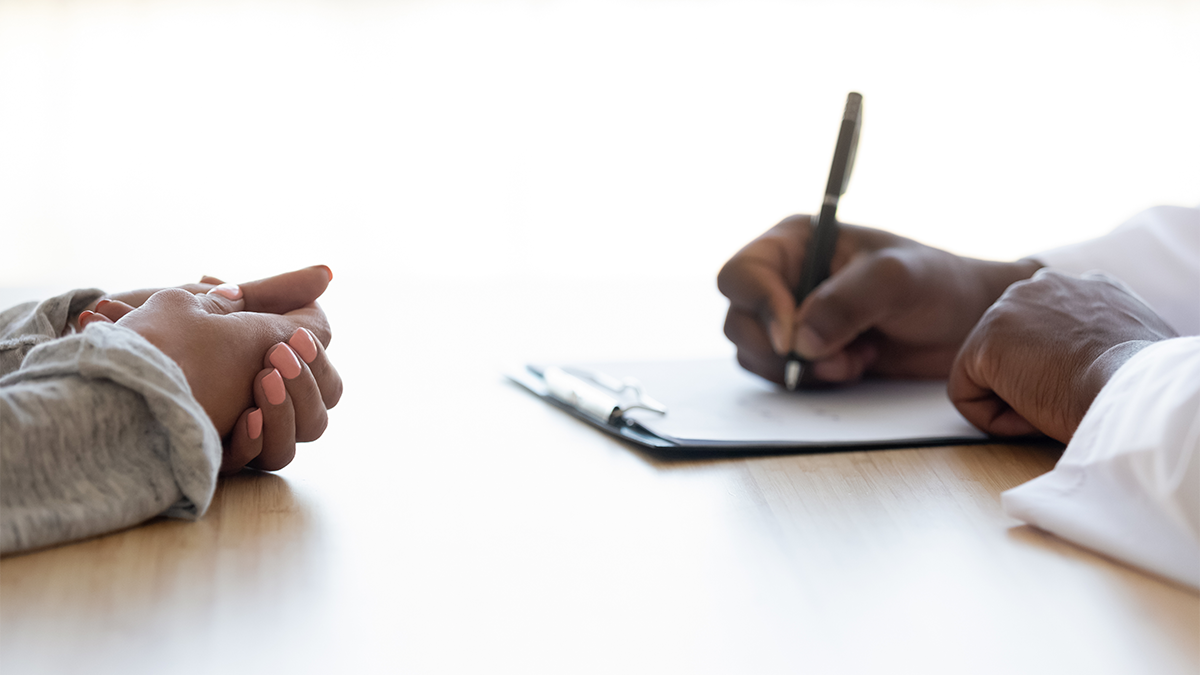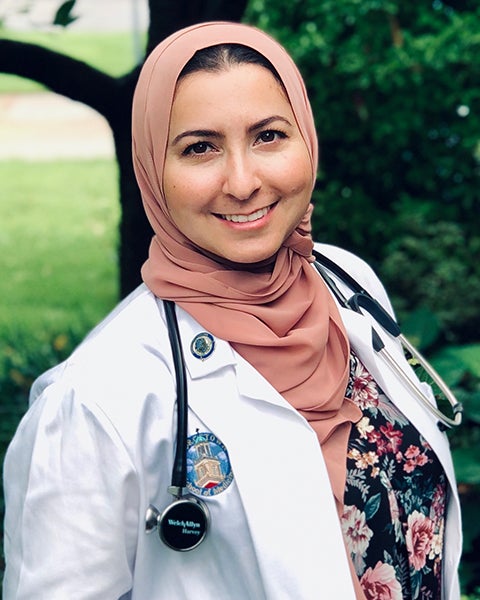Georgetown Students Help Recently Arrived Refugees Navigate the U.S. Health Care System

Posted in News Stories | Tagged Health Navigator Program, refugees, service to others, student experience
(September 29, 2022) — After a community-based learning project highlighted the challenges faced by refugees in picking up medication from a pharmacy, a group of medical students created a new program — the Health Navigator Program — to match students to families to broaden the assistance they could provide.

“The refugee community is often overlooked and neglected, and there is a need for these services in Washington, DC, which has a large refugee community,” said Emily Phelps (M’24), one of the founders of the Health Navigator Program.
The goal of the Health Navigator Program is to remove barriers to care for newly arrived refugees by identifying critical resources, explaining the complex web of interconnected health care providers, and giving them advice so they can access the care they need.
“Through the Health Navigator Program, our volunteers are reminded how to be human, how to connect with a vulnerable population who are new to everything in the U.S. and are trying to navigate the health care system here,” said Ruba Omeira (M’24), who co-founded the program.
Working with Local Agencies

The Health Navigator Program emerged out of a community-based learning (CBL) course taught by Sarah Kureshi, MD, MPH, associate professor of family medicine, where 15 medical students partnered with NOVA Friends of Refugees, a grassroots refugee support organization, on a project assisting refugees with their first visit to a U.S. pharmacy.
Phelps and Omeira were two of the students involved in the CBL course. Phelps had the idea to expand the pharmacy project into an ongoing resource for newly arrived refugees and reached out to Omeira as well as their peers Thu Dao (M’24) and Mohamad Almasri (M’24) to see if they were interested in building the program together.
The Health Navigator Program began its first yearlong cycle in September 2021 as a branch of HOYA Clinic with over 100 medical, nursing and master’s students volunteering. The program asks for a year’s commitment from volunteers to check in weekly with their assigned refugee families.
“During our first year, we actually had more volunteers than families, so we weren’t able to pair every volunteer with a refugee family,” explained Phelps.
“We work with local refugee agencies to match families with volunteers based on agencies’ needs,” explained Omeira. “The agencies are linked with families as soon as they arrive to help them with the resettlement process.”
During the 2021-2022 cycle, the Health Navigator Program worked with 60 refugee families, mainly from Afghanistan.
“We also created a mini-training for volunteers in addition to the specific training the agency provides, as well as a large Google Drive folder with resources to answer questions that many of the arriving families ask,” Phelps said.
The agencies also offer translation services, but Phelps and Omeira acknowledged the need for more of these services. “A language gap can be difficult for volunteers,” said Phelps.
Dedicated Volunteers
Now in its second year, the Health Navigator Program is recruiting volunteers who are committed to working with a refugee family through June 2023.
In addition to the weekly check-ins, volunteers may help make medical appointments, clarify recommendations from physician visits, and communicate with physicians and pharmacies on behalf of the refugee family.
“The volunteers are helping families navigate the medical system, such as seeing a specialist or filing a prescription, and not offering medical advice,” said Phelps.
The leaders of the program try to match students from different disciplines (a medical student with a master’s student) so that their schedules do not overlap and at least one student out of the pair could be available to assist the refugee family as needed.
Many of the volunteers go above and beyond their obligations to the family. Sean Kyle (M’24) was partnered with a family from Afghanistan who were trying to figure out how to immunize their two sons, especially against COVID.
“As we were talking during one of our check-ins, the father mentioned that he was trying to get more furniture for his family,” Kyle said. “I then asked around a Facebook group that my wife is part of for furniture that people were not using anymore. I was able to pick up and drop off a nice TV for them.”
Sarah Wong (G’22) volunteered as a student in the Special Master’s Program in Physiology and was paired with a refugee family that included a child with a neurological disorder requiring the care of specialists. Wong connected the family with primary care physicians and specialists, and helped the family seek clarification from test results reported in an online system.
“It was difficult to explain why the child couldn’t see a specialist right away, given the restrictions of the U.S. health care system,” said Wong. “The family members were working full-time and it was difficult for them to constantly make follow-up appointments in order to get referrals to finally see the specialist they needed.”
Wong’s family also unexpectedly lost access to their Medicaid health care coverage for three months due to a system error within social services, resulting in delayed care. “One of the biggest barriers for refugee families is getting insurance,” said Omeira. “It is very stressful for the families to have a delay in receiving care.”
Omeira also discussed how the volunteers and their assigned families organically developed relationships that extended beyond the Health Navigator Program. Though she graduated from Georgetown last summer, Wong remains in touch with her refugee family by volunteering directly through the local agency.
Phelps hopes a new, energized group of students will step up to lead the program, especially after she and Omeira graduate next year.
“At the most basic level, this program is about why we went into medicine — it’s about helping serve the most vulnerable to get the care they need,” she said. “I hope it keeps going.”
Heather Wilpone-Welborn
GUMC Communications
